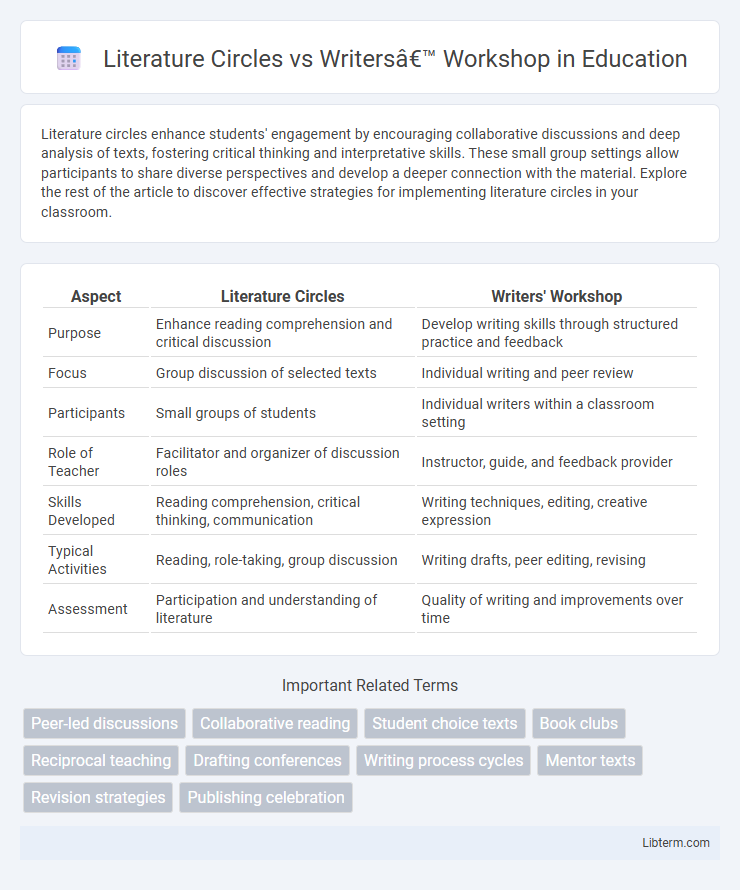Literature circles enhance students' engagement by encouraging collaborative discussions and deep analysis of texts, fostering critical thinking and interpretative skills. These small group settings allow participants to share diverse perspectives and develop a deeper connection with the material. Explore the rest of the article to discover effective strategies for implementing literature circles in your classroom.
Table of Comparison
| Aspect | Literature Circles | Writers' Workshop |
|---|---|---|
| Purpose | Enhance reading comprehension and critical discussion | Develop writing skills through structured practice and feedback |
| Focus | Group discussion of selected texts | Individual writing and peer review |
| Participants | Small groups of students | Individual writers within a classroom setting |
| Role of Teacher | Facilitator and organizer of discussion roles | Instructor, guide, and feedback provider |
| Skills Developed | Reading comprehension, critical thinking, communication | Writing techniques, editing, creative expression |
| Typical Activities | Reading, role-taking, group discussion | Writing drafts, peer editing, revising |
| Assessment | Participation and understanding of literature | Quality of writing and improvements over time |
Introduction to Literature Circles and Writers’ Workshop
Literature Circles engage students in small, collaborative reading groups where participants assume specific roles to discuss and analyze texts, fostering critical thinking and deeper comprehension. Writers' Workshop offers a structured approach to writing instruction characterized by independent writing time, mini-lessons, and peer conferences, promoting individualized skill development and creativity. Both methods emphasize active student participation but target different literacy skills: literature appreciation and textual analysis in Literature Circles, and writing process mastery in Writers' Workshop.
Key Principles of Literature Circles
Literature Circles emphasize student-centered discussion, where participants select books based on interest and engage in small-group dialogues to deepen comprehension and critical thinking. Key principles include role-based responsibilities such as summarizer, questioner, and connector, which foster accountability and diverse perspectives within collaborative learning. This approach contrasts with Writers' Workshop by prioritizing reading and interpretive skills over writing development.
Core Elements of Writers’ Workshop
Writers' Workshop centers on core elements such as mini-lessons focused on writing techniques, independent writing time, personalized teacher conferences, and peer sharing to foster revision and editing skills. This structured approach emphasizes student choice in topics and genres, promoting ownership of the writing process and development of voice. Unlike Literature Circles, which prioritize collaborative reading and discussion, Writers' Workshop cultivates individual writing fluency and workshop community through targeted instructional practices.
Goals and Learning Outcomes Compared
Literature Circles foster collaborative discussions and critical thinking skills by engaging students in analyzing diverse texts, promoting comprehension and interpretive abilities. Writers' Workshop emphasizes the development of individual writing skills through drafting, revising, and publishing, enhancing creativity and mastery of written expression. Both approaches improve literacy but focus on different learning outcomes: Literature Circles prioritize reading comprehension and communication, while Writers' Workshop targets writing proficiency and authorial voice.
Student Roles and Responsibilities
In Literature Circles, students take on specific roles such as Discussion Director, Summarizer, and Connector to collaboratively analyze texts and foster peer-led discussions. Writers' Workshop emphasizes individual responsibility where students plan, draft, revise, and edit their writing, supported by teacher feedback and peer critiques. Both models empower students through active participation, but Literature Circles focus on collaborative interpretation while Writers' Workshop centers on developing writing skills.
Classroom Implementation Strategies
Literature Circles emphasize student choice and collaborative discussions, where students assume roles such as summarizer or questioner to deepen comprehension of shared texts, allowing teachers to facilitate rather than lead. Writers' Workshop prioritizes individual writing processes, incorporating mini-lessons, independent writing time, and peer conferencing to enhance skills and creativity. Effective classroom implementation blends structured routines with flexible groupings, fostering engagement through authentic dialogue in Literature Circles and personalized feedback in Writers' Workshop.
Assessment and Feedback Methods
Literature Circles emphasize peer assessment and collaborative feedback, where students discuss texts and evaluate each other's contributions through group reflections and role-specific checklists. Writers' Workshop utilizes teacher-led formative assessment, with individualized conference sessions providing targeted feedback on writing skills and progress. Both methods promote ongoing dialogue, but Literature Circles focus more on peer interaction, while Writers' Workshop centers on personalized teacher guidance.
Benefits of Literature Circles
Literature Circles foster collaborative learning by encouraging students to discuss diverse perspectives and develop critical thinking skills through peer interaction. This student-centered approach promotes deeper comprehension of texts as participants take on specific roles, enhancing engagement and accountability. Literature Circles also support differentiation and choice, allowing learners to connect with literature that matches their interests and reading levels, thereby boosting motivation and reading proficiency.
Advantages of Writers’ Workshop
Writers' Workshop promotes individualized student growth by allowing learners to develop unique writing styles through personalized feedback and iterative drafts. This approach enhances critical thinking and creativity by encouraging self-reflection and peer collaboration within structured writing processes. Unlike Literature Circles, Writers' Workshop cultivates advanced writing skills and student ownership over their written work, leading to improved literacy outcomes.
Choosing the Right Approach for Your Classroom
Literature Circles foster collaborative reading and discussion, encouraging students to engage deeply with texts through roles like summarizer, questioner, and connector, while Writers' Workshop emphasizes individualized writing development, guiding students through drafting, revising, and publishing their work. Selecting the right approach depends on classroom goals: Literature Circles work well for enhancing comprehension and critical thinking in reading, whereas Writers' Workshop is ideal for cultivating writing skills and creative expression. Assessing student needs, curriculum standards, and available resources ensures the chosen method effectively supports literacy growth.
Literature Circles Infographic

 libterm.com
libterm.com